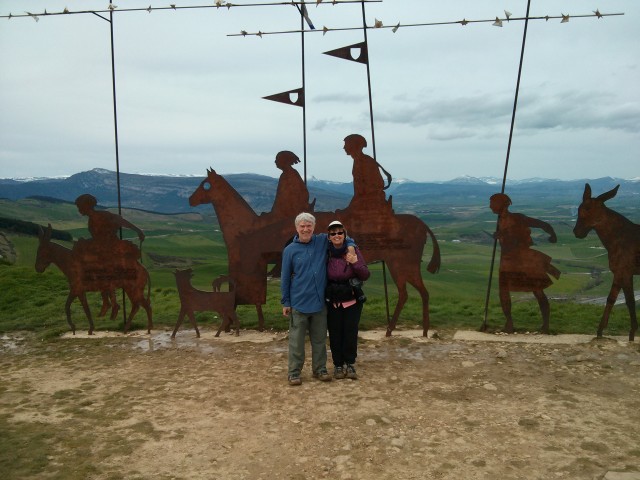Charlie: we are still processing the fact that we have finished the Camino and what it all means.
When I walk to the store it is all about the destination, the walk is just the means. When I take a walk around the neighborhood it is all about the journey, there is no destination as such. Originally the Camino was mostly about the destination, to get to Santiago, to show your faith in God, to get the indulgence. The journey was significant only in that it was hard and a sacrifice and was a penance for your sins. For us, the Camino was all about the journey. We liked the day-to-day rhythms. We liked the fact that each day, each little town, each kilometer was different and interesting. We liked seeing the small towns and how the people lived. You can see things walking that you can´t see any other way. In this sense it was travel, a vacation.
Travel involves endless decisions, where to stay, where to eat, when to stop, etc. The biggest thing we learned was not to try to optimize every decisión, to accept what we got.
We also liked the rhythm: every day you get up, put on the pack and walk. It was always fun to get started. It was nice to be done at the end of the day.
Getting close to Santiago changes things. The destination becomes more important. It hit me when we had four days to go. They were all planned out. In a way we weren´t on the Camino anymore but walking to Santiago. I could not feel the day to day any more, it was all about the destination. I guess this is what all pilgrims feel when they get close to Santiago. It changes the trip. Another thing to learn on the Camino.
PS. I´m typing this on a keyboard at our hotel in Madrid. It is a sea of red underlining because the spell checker seems to be checking for Spanish. I noticed it added an accent to decisión. There are probably tipos. (Whoops it changed the shortening of typographic error to tipo.)

We’ve all learned from your Camino. You planned it well, documented it well, and of course most importantly walked it so well, and with such generosity to us who may, too, someday walk our own Caminos, following quite literally in your footsteps. Remarkable how all those metaphors become real.
When do you come home? Are you already home? Are you seeing your familiar world with new eyes? Are you changed in deep ways?
Thank you so much for sharing this amazing adventure!
Love,
Dan
Here’s something *not* to do (though I bet it’s crossed your mind): make a Camino app. It would automatically log the geolocations (as you’ve been doing manually) and obviate the stamps in the passport. That would make the process more efficient, accurate, and measured and would take away its charm.
Whoops, I spoke too soon… It’s been done. Several times. E.g. https://itunes.apple.com/us/app/camino-de-santiago/id524341271?mt=8 and http://wisepilgrim.com/http%3A/%252Fwisepilgrim.com/more/camino_frances_iphone_app
I guess the challenge is to use them wisely… in addition to, not instead of, the traditional ways.
–Dan
I think your idea of not trying to optimize every decision is very wise. I’ve been thinking about it a lot since I read this. It applies in lots of situations. For example, standing in line at the grocery store. If I’m in a long line I often get impatient and unhappy even if I’m not really in a hurry. I’ve figured out it comes from feeling I’m in the “wrong” line. I’m unhappy because I think I made a mistake. If I let go of that idea and just accept what I got I can feel a lot better.
Jean